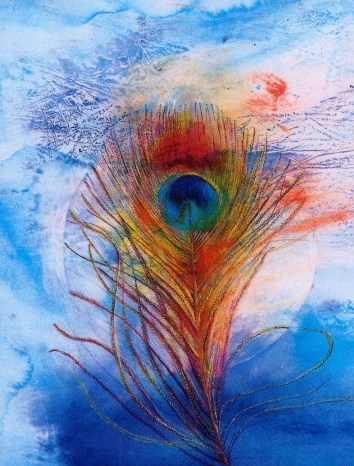In a spiritual book that I once read many years ago, was the story about the girl in the tower and the man who loved her:
“”Tell me what you want and I’ll do it,” he said to the girl in the tower. He had everything and he gave her everything but each day he prayed if only she could ask for his life, also.“
Why did he pray for that? Perhaps because he wished she loved him as much as life itself also. Perhaps because if she asked him for his life it’d mean she actually cared enough to want something more precious of him. Perhaps he wanted her to take him more seriously because he was serious about her. Or perhaps he is signaling to her that he is truly committed and invested – that he is risking something of high worth to him, something that is costly to him, in order to prove that he is not a fake. Because true love knows of nothing greater than a man who’d lay his life in the feet of his beloved.
Some evolutionary psychologists will say that our main drivers in life are: have something to eat, do not get eaten, and find a mate. In that way, a lot of our behaviour may resemble that of animals, particularly when it comes to mating.
For example, subconsciously when we are attracted to someone, we start to mimic their gestures to signal our submission and approachability. If they touch their face, we touch our face. If they play with their hair, we play with our hair. If they pick up the fork, we pick up the fork. If they try the pickle, we reach out to try the pickle. They laugh, we laugh. They say a stupid non-sensical word, and next thing we know – we’ve adopted that silly non-sensical word as our favourite new addition to our sentences. Mimicking is how many animals begin their courting phase before mating. Have you seen hawks fly? They synchronize their flight as a love dance when they choose their partner. We also mimic when we want to make up after a fight. It’s much harder to say “I’m sorry” than it is to say, “I’ll eat what you are eating.” But I digress.
I was recently listening to a lecture on Evolutionary Psychology, where the professor briefly talked about the Zahavian Signaling Theory, otherwise known as the Costly (Honest) Signaling Theory; and it inspired me to explore its application to human relationships further. Let’s begin.
The Costly Signaling Theory
The costly signaling theory proposes that animals, and humans, may send honest signals about desirable personal characteristics and access to resources through costly displays, altruism, or other behaviours that would be hard to fake.
This means that a signal is honest only it if it costly to the sender. Otherwise, it can be easily faked or imitated by those who are not honest.
Many species of the animal kingdom engage in the courtship gift giving ritual. And it is the quality of the gift that will determine whether the female will mate with the male or not. What we do as humans is very similar to this. For example, marketers will often say that a man is supposed to spend a quarter of his yearly salary on an engagement ring. But this is not about money, it is about cost and value. It is about how much of what is truly of high worth for me, am I willing to offer and generously give to another person, to signal my honesty and commitment. Generosity is an honest signal because we move away from our self-serving interests for the benefit of another.
There is also another side to this theory and it is precisely the notion that if we are willing to give away something valuable from our reserves, this implies (and sends yet another signal) that we have even more in our reserves that the other party hasn’t seen yet. For example, when a predator approaches, the gazelles start stotting, which is behaviour of jumping highly into the air, making themselves more visible. By doing this, they are essentially signaling to the predator that they have fitness and strength not seen yet, because they are engaging in high risk behaviour despite the approaching danger.
Marriage is a serious deal, and choosing our marriage partner ultimately chooses the kind of life that we will live. I hear many people nowadays say that they don’t want to marry because they just don’t believe in the institution of marriage. But is that really honest? Is it because some don’t want the responsibility? And it doesn’t have to be marriage – this is about commitment, which implies responsibility. I have noticed that the modern swapable mentality culture tends to be a bit … cheap. And when I say cheap, I am referring to emotional availability and willingness to give – because money is never about money.
To the ladies, I’ll always say: make sure you are choosing someone who is offering you something of value. Don’t suffice for bread crumbs just because the real worthy ones are harder to find. If a man is not investing in you and providing something of value, don’t waste your time. Choose wisely because you are ultimately making a decision about your own life. And to all of us I’ll say: remember that time is the most precious good that we have – because it is limited.
While I am talking about costly signals, I do want to add a side note: Our virtues such as humility, compassion, tenderness, empathy, altruism, authenticity, and kindness, are the most expensive, valuable, and even, priceless. While many people may try to mimic them, no one can fake these for too long, and eventually people’s masks fall away. So, when you find these qualities in another person, make sure you hold onto them – because this is what truly matters.

Art by Robert M Place
Heroism as Costly Signaling.
What’s love worth? How far would we go? It is no secret that men tend to go to great lengths and even engage in risky behaviours for the one they love. I once knew a man who drove twelve hours just to see me for two hours on a bench and then he had to drive back again another twelve hours to start his work shift. All we did was just sit on a bench and talk. And we all know of the many “showing off” rituals that men, especially younger men, do to exhibit their strength, virility and courage. Personally, I’ve never been interested in bank accounts, cars or job titles – because all I cared about was seeing the man’s qualities, such as chivalry, integrity, emotional maturity and strength in vulnerability; because I am interested in building kingdoms, rather than sand castles.
This is the higher meaning and symbolism of “the knight in shining armour”: he goes into the forest to fight the dragon (i.e. his fears and his shadow self), so that he can emotionally mature and become a man. And he can then prove his worthiness, devotion and earn something of real value – to then take off his glamorized shining armour and truly offer his naked heart to someone by opening up in a vulnerable, emotionally mature way.
Women don’t want to be saved, but they need to feel safe and stable with a man, this is at their core; and it is at the very core of a man that he desires to feel needed and provide her stability. That’s just psychology and biology.
What happens nowadays is that people want “steps” for happy lives and loves, and it should be less than seven, because of short attention spans and anything more than that we just won’t read – we prefer to gain knowledge from memes anyway. But there are no steps for relationships, no steps for love, no quick fixes, no maps with directions. This is the reason why I don’t like writing for publications because it is always about click baits and steps. Our brains are being hacked and we are not paying attention to what truly matters and to the people in our lives.
Paying attention and holding ourselves accountable is what relationships are often based on.
The scary word, accountability. It’s scary because we were given a great power to hold in our hands, called the phone. It is so smart that within a second people can ghost someone they’ve been talking to for months; they can delete and erase and block; they can pause or ignore until they are interested once again; they can talk selfishly without looking into someone’s eyes nor considering how their words affect another; they can hurt people without seeing their tears; they can share without meaning. I don’t mean to sound old school, though I am now well into my thirties – but I do want to remind all of us that while it is natural for us to evolve and change with technology, we must not ever forget our human values, and our humanness. We can’t expect that modern technology is not changing our behaviour and mentality, turning us just a bit too robotic and unappreciative. And less accountable, if at all.
The lack of relationship accountability is like a state of stable ambiguity; people are giving “just enough” not to feel alone but to get the reward of affection, while certainly not giving “too much” to compromise on our freedom and become trapped because of our unwillingness, and fear, to commit.
This also leads to uncertainty, anxiety, fears, paralyzing self-doubt and unworthiness issues, and overall unhappiness. Ghosting, icing, breadcrumping and all other sociopathic behaviors that modern society has adopted as “normal”, are actually the manifestations of the decline of empathy in our world or in other words, the promotion of one’s selfishness disregarding the consequences on another human being. With digital communication, there is the forgetfulness that a human being is on the other end of the message and we fail to see how our words affect them. This also means no boundaries and no limits.
When something is costly and important for us, when we’ve invested into it, then we have something to lose and we’ll be more careful and responsible with it.
How much is love worth to us?

Art by Robert M Place
The greatest lover is the one who pays attention.
Paying attention means looking beyond the vision of the eyes; to see beyond the smile of our beloved, that they’ve been stressed from work; to stop everything and take their hands, and say, “tell me, my love, what’s bothering you, how can I make your day better”.
Paying attention means putting down the phone, switching off the TV, and saying, “let’s go to that new restaurant you wanted to try.” Often in our interactions, we give to the other what we need to be given, rather than what they need to receive. Paying attention means touching, trusting, and sharing our tenderness. It means caring and holding our beloved not the way we always did, but they way they need to, right now. We need to have the humility to accept that we all change and that’s okay; but just like a painting, there is always something new to discover if we spend the time to observe it, a new shade, from a new angle perhaps. And how beautiful it is, the art of noticing and discovering the unique changing world of another person. But we can only love what we appreciate – and to appreciate takes time, effort and devotion.
We make love in so many ways, not just with our genitals. And how boring it’d be if that’s the only way we made love. We have hands, eyes, sounds, minds, feelings, senses.
And when we pay attention, we fall in love all over again. This is the Art of Loving.
Fighting the dragon is just a symbolism for our willingness to be open and vulnerable; our readiness to build something long-lasting and stable. In every step of the way, we’ll have to show our commitment and honesty all over again. And these costly signals are not absolute; they are always relative. So as the relationship develops, we’ll have to invest more to match the level of commitment. When we have something to lose, we are more diligent and more accountable.
how can loving be anything other than
everything, everything
Love demands everything. It is not half way in, half way out. Love takes everything and gives everything, and so it costs everything. It’s expensive just like our heart is expensive. It is not meant to be shared with everyone; only with those worthy of our trust, tenderness, and devotion. We all have our own love languages in how we express our feelings and affection, but one thing will always remain true and it is: when something is honest and true to our heart, it has a high cost but it is always worth it.
For personal readings with me, you are welcome to browse through my Offerings.

For more of my writings, browse through my Art of Love.
If you wish to support me and my work, you may do so by sharing it or donate here. For personal readings with me, you may visit my Offerings.
Your support means so much to me! Thank you wholeheartedly!
Cover artwork by Margarete Petersen.




